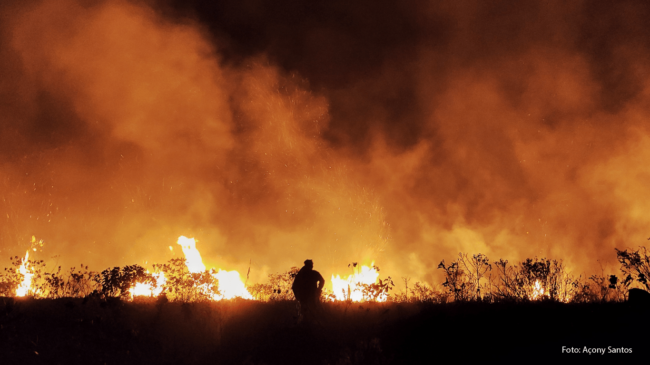 07.12.2023
07.12.2023
Climate Finance: Who Bears the Costs of Climate Change?
Philanthropy can be a catalyst, channeling more resources to where they are needed, facilitating adaptation and ecological transformation in territories.
Originally published in Carta Capital
By Cristina Orpheo and Rubens Harry Born*
Ever since the Climate Conferences (COPs) promoted by the UN began, a crucial and complex issue that has been addressed is who will reach into their pockets to foot the bill for mitigating the causes and promoting adaptation to climate change’s impacts. In the United Nations Framework Convention on Climate Change negotiations, even before the first COP in 1995 in Germany, representatives of nation-states engaged in numerous debates and negotiations to address the costs of the social, environmental, and economic impacts of global warming.
The most challenging aspects to move forward with the agenda have been clearly to determine who foots this bill and what conditions must be met by those receiving the resources.
The premise adopted since the Framework Convention is the principle of common but differentiated responsibilities, assuming that historically, wealthier nation-states are mainly responsible for most of the anthropogenic greenhouse gas emissions causing the climate crisis. Therefore, developed countries should finance mitigation and adaptation measures in developing countries.
While developed countries are hesitant to pay this bill, developing countries argue that extreme climate events have been increasingly present in their territories and they lack resources to face them.
In 2009, during COP15 in Copenhagen, a target was set for developed countries to raise collectively $100 billion per year for climate crisis combating actions between 2020 and 2025. This commitment was confirmed by the Paris Agreement in 2015. COP27, held last year, emphasized that this target has yet to be met, reiterating the urgent request to developed countries to mobilize these resources to meet the needs of developing countries.
Even though there has been some progress in climate financing, with the creation of national and international funds and arrangements involving governments, private sector, philanthropy, among other actors, these still insufficient resources are even scarcer when considering grassroots organizations, movements, and leaderships. For instance, at COP26 in 2021, several countries and organizations – UK, USA, Germany, Norway, and the Netherlands, alongside 17 foundations – announced the Indigenous Peoples and Local Communities’ Forest Tenure Pledge, a commitment to donate $1.7 billion from 2021 to 2025 for indigenous peoples and traditional communities to continue protecting their territories and playing a crucial role in the fight against the climate crisis.
One year after this announcement, the initiative’s annual report reveals that around $321 million had been donated, with half (51%) channeled to international NGOs operating projects with indigenous peoples and traditional populations. Governments accounted for 17% of this value, followed by regional agencies or funds (8%). Only 7% of the resources were directly made available for indigenous and traditional population organizations.
Traditional, indigenous, quilombola, riverside, peripheral communities of major cities, and political minorities are the social groups most affected by climate change. Paradoxically, they are also the main protectors of forests and work to defend the environment, their territories, and natural resources.
The different segments involved in this agenda (governments, multilateral institutions, companies, philanthropic organizations, and non-profit entities, among others) will need to reorient their methods and focus on these communities, aiming to facilitate the arrival of resources where they are most needed. Large financial sources, such as private banks, national and international climate funds, and other arrangements and initiatives that usually allocate resources to major projects, need to democratize access.
Philanthropy can catalyze this action, channeling more resources where they are needed, facilitating adaptation, and ecological transformation in these territories. National and international philanthropy has increasingly engaged in the climate agenda and made commitments, such as the Philanthropy for Climate initiative. However, a report published by the Climate Works Foundation in 2023 shows that philanthropic funding for mitigating climate change has slowed compared to the previous year and the growth recorded between 2019 and 2021.
We have observed a trend in international philanthropy to operate in blocs and donor networks, making pledges to finance the climate agenda. In Brazil, support for this agenda is starting to happen but still at a timid pace compared to what is needed. For philanthropy to have the necessary impact, it must increase its ambition to promote transformative climate solutions in partnership with a broader range of communities, movements, and organizations. Transfer more funds, as quickly as possible, to the places that need them most. And demonstrate coherence in action regarding inequalities and the intrinsic connection of the climate emergency with the human rights advocacy agenda.
We have a diverse philanthropy, including private social investment, family investment, movements for a culture of donation, independent funds, among others. Innovative and significant initiatives built based on our reality and needs, such as the Comuá Network, which brings together independent donor organizations articulated through community and socio-environmental justice philanthropy, of which the Casa Socio-Environmental Fund is a member. These organizations will be at COP28 discussing the importance of truly fair climate financing.
Given the urgency, the Brazilian philanthropic movement must aim to be more pragmatic and assertive, relinquishing individual prominence for a truly collective action that brings more power and reach to the use of resources.
About the authors:
Cristina Orpheo is the executive director of the Casa Socio-Environmental Fund, a Brazilian local fund with 18 years of operation, supporting over 3,000 socio-environmental projects and donating over R$100 million directly to grassroots community organizations. With a degree in Administration and postgraduate studies in social project management, the third sector, and environmental management, she specializes in project development and management, strategic planning, resource mobilization, and grantmaking strategies.
Rubens Harry Born is a lawyer and civil engineer, specialized in environmental engineering. With a Master’s and Doctorate in Public and Environmental Health, Rubens is a founder and advisor to the Casa Socio-Environmental Fund. He specializes in environmental sustainability, social development, citizenship, law, and global and local governance.
